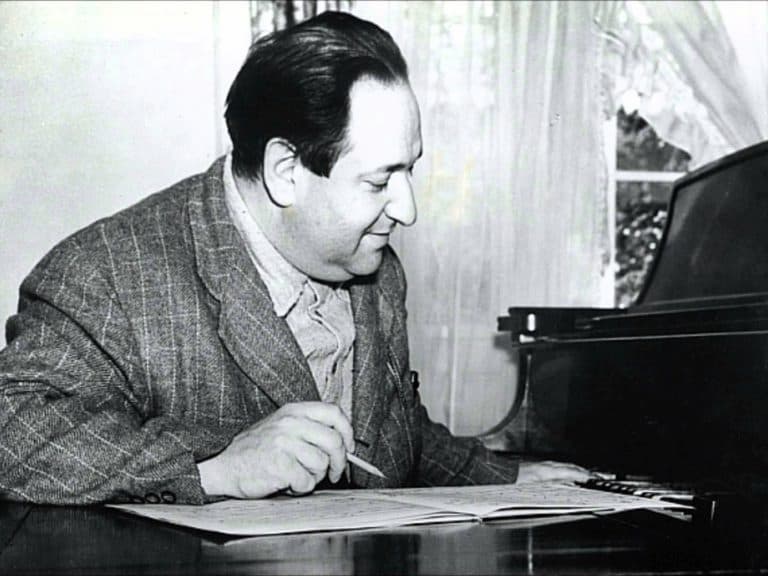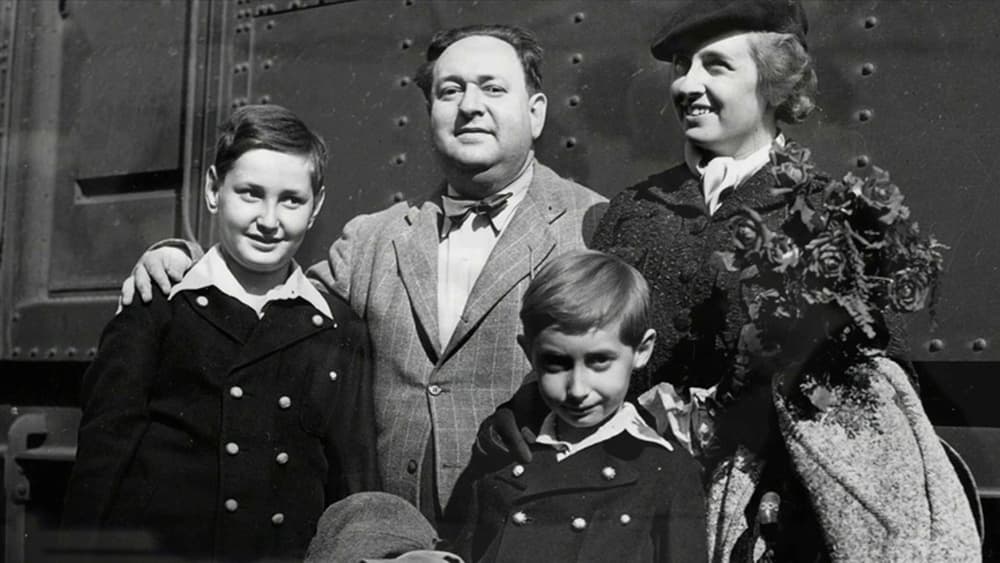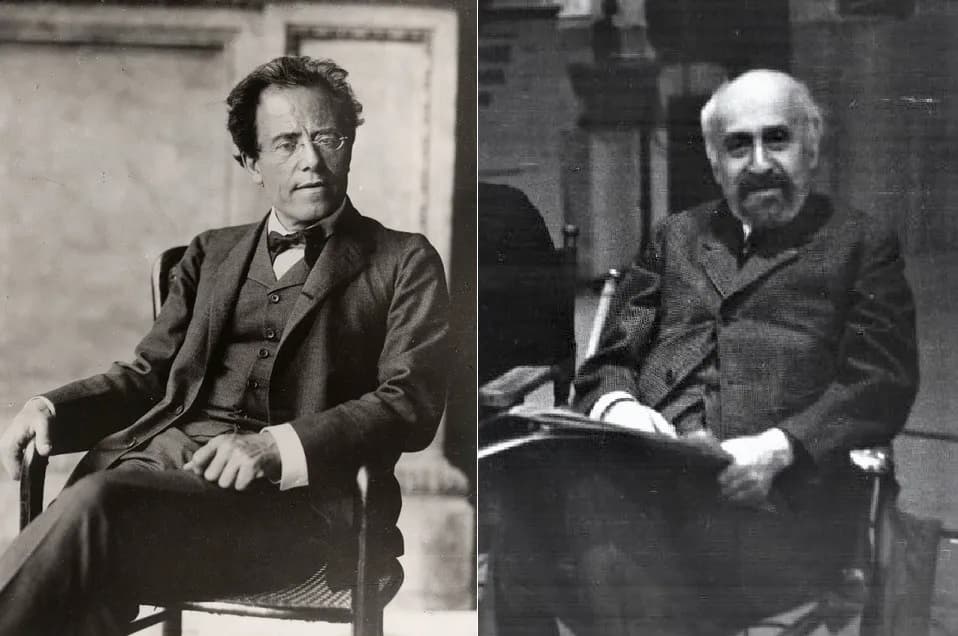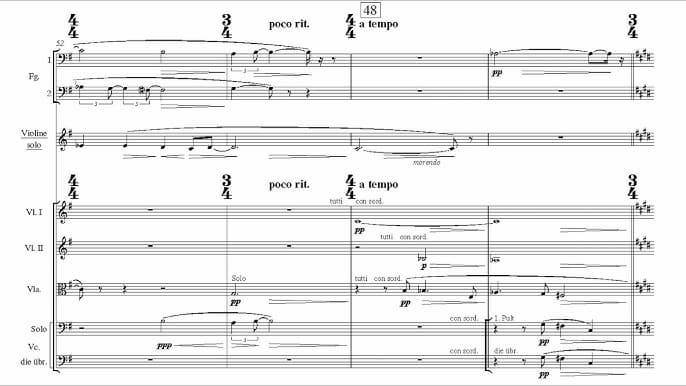In 1959 the Greek/American conductor Dimitri Mitropoulos wrote: “All my life I have searched for the perfect modern work. In this symphony I have found it. I shall perform it the next season.” The work in question was Erich Wolfgang Korngold’s Symphony in F-sharp Major, completed in 1952. Sadly, Mitropoulos passed away in 1960, and the Korngold Symphony project was shelved again. Finally, on 27 November 1972 the work received its live premiere—although it has been played several times on European radio previously—in Munich under Rudolf Kempe.
Erich Wolfgang Korngold: Symphony in F-sharp Major, Op. 40 “Moderato, ma energico” (BBC Philharmonic Orchestra; Edward Downes, cond.)

Erich Wolfgang Korngold
At the end of World War II, Erich Wolfgang Korngold (1897-1957) decided to completely retire from writing film music and devoted the rest of his life to composing concert music. The vast majority of his works were critical failures as the prevailing fashion of post-war Europe celebrated serialism and atonality. Korngold was frequently taken to task for not embracing modernism, but he steadfastly “saw endless possibilities in both traditional forms and language.”
As he wrote to an old friend in 1952, “No, I have not become atonal and I believe that my new Symphony will prove to the World that monotony and modernism at the cost of abandoning invention, form, expression, beauty, melody – in short, all things connected with the despised ‘romanticism’ – which after all has produced some not so negligible masterpieces! – will ultimately result in disaster for the art of music…” For a number of scholars, the Symphony in F-sharp Major is possibly the most personal work that Korngold composed, as it seems to sum up his own artistic and personal struggles.
Erich Wolfgang Korngold: Symphony in F-sharp Major, Op. 40 “Scherzo-Trio” (BBC Philharmonic Orchestra; Edward Downes, cond.)

The Korngold Family
Korngold had suffered a major heart attack in September 1947, and after an extended stay in hospital, he took a holiday in Canada. Once there, the composer started to formulate a plan for a large-scale symphony. However, according to Korngold scholar Brendan Carroll, “the seeds of the work had been in his mind far longer than might be suspected. I came across a sketch for the opening of the first movement dated Christmas Eve 1919. The date of the sketch was written in the hand of Korngold’s father, as Christmas Eve was his birthday and his son invariably presented him with a new composition each year.”
Korngold had been an incredible child prodigy, jealously resented as a product of Europe’s most influential music critic. In the 1920s he was a major Viennese opera composer, but he was denounced as a Jew and forced to flee under the Hitler regime and forced to take musical refuge in a Hollywood film studio. Finally, he was dismissed as a romantic conservative, completely out of step with post-war modernity.
Erich Wolfgang Korngold: Symphony in F-sharp Major, Op. 40 “Adagio” (BBC Philharmonic Orchestra; Edward Downes, cond.)

Mahler and Julius Leopold Korngold
Commentators have claimed that the F-sharp Symphony contains a hidden programme that reflects the tragedy of the Holocaust. Others have heard it as a funeral march tribute to President Roosevelt, to whose memory the symphony is actually dedicated. Korngold denied these suggestions, writing in the third person in 1955: “The composer characterises his new symphony as a work of pure, absolute music with no program whatsoever, in spite of his experience that many people – after first hearing – read into the first movement the terror and horrors of the years 1933 – 1945, and into the Adagio, the sorrows and sufferings of the victims of that time.”

Erich Wolfgang Korngold: Symphony in F-sharp Major
In the “Adagio,” one of Korngold’s most profound slow movements, the composer returns to the symphonic models of his mentor Gustav Mahler. Mahler, after all, had pronounced him a genius at the age of nine. Here he creates a funeral march of overpowering solemnity, opening with a three-note theme that develops into an extended elegy. Building from one impassioned climax to the next, the music bursts into the major key before closing in resigned conclusion. This enormous late-romantic symphony is “a great work of art in the long line of major symphonies from a highly individual composer.”
For more of the best in classical music, sign up for our E-Newsletter
Erich Wolfgang Korngold: Symphony in F-sharp Major, Op. 40 “Finale” (BBC Philharmonic Orchestra; Edward Downes, cond.)
